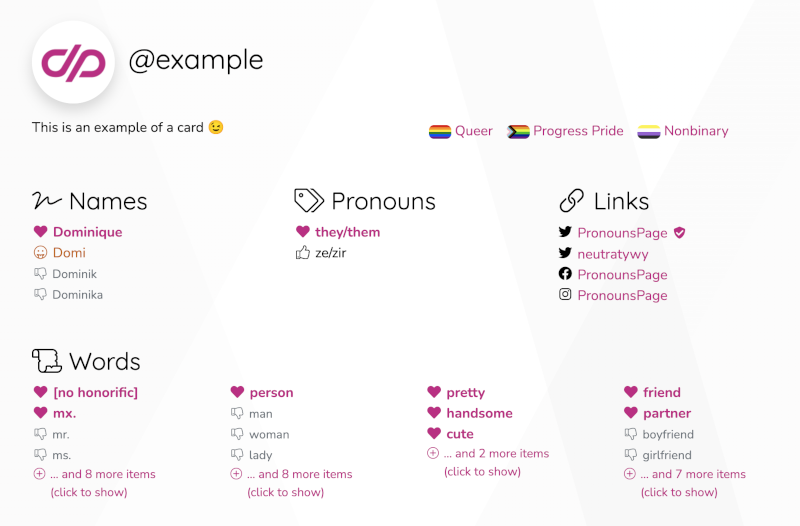List of popular pronouns
You can use this website to create a personal, multi-lingual card with your names, pronouns, identity words, pride flags, etc. – which you then can link in your bio or email footer. It's a simple way to let people know how they should refer to you!
Binary forms
It's worth mentioning that pronouns ≠ gender. One can still be nonbinary while using pronouns that are congruent with (or opposite to) their gender assigned at birth.
- she/her – Normative “she/her” Normative
- he/him – Normative “he/him” Normative
Normative-ish forms
Those pronouns have been in common use in normative English already, but recently they got a slightly different new usage: describing a single, specific person. If you want to link to plural “they”, use this link.
- they/them/themselves – Singular “they” Normative
- they/them/themself – Singular “they” Normative
- it/its – Personal “it” Normative
- one/one's – Specific “one” Normative
Popular neopronouns
Unlike the other pronouns, which are officially recognised as “grammatically correct”, albeit used in a different meaning than we're used to, neopronouns are novel. Not being included in dictionaries doesn't make them any worse, though!
Other neopronouns
These neopronouns are less often used than their more popular counterparts, but it doesn't make them any worse (and some of them are historically notable). Some neopronouns' names are derived from the names of their creators. If your pronoun is not on the list, use the generator below!
- co/cos – Neopronoun “co/cos”
- e/em/eir – Spivak pronouns
- e/em/es – Neopronoun “e/em/es”
- hu/hum – Humanist pronouns
- ne/nem – Neopronoun “ne/nem”
- ne/nir – Neopronoun “ne/nir”
- per/per – Person pronouns
- s/he/hir – Neopronoun “s/he”
- thon/thons – Neopronoun “thon”
- ve/ver – Neopronoun “ve/ver”
- vi/vir – Neopronoun “vi/vir”
- vi/vim – Neopronoun “vi/vim”
- zhe/zher – Neopronoun “zhe/zher”
Other pronouns
Generator
You can also use this tool where you fill out the blanks in sentences and generate a link ready to share with others.
Interchangeable forms
Many nonbinary people use more than one form interchangeably and are fine with being called either of them. Some like when others alternate between those forms when talking about them.
Avoiding gendered forms / no pronouns / null pronouns / pronounless / nullpronominal / nameself Normative
Some people prefer not using any pronouns, instead being referred by name, initial, omitting pronouns with passive voice, or restructuring the sentence. See: lypomania's guide, Nullpronominal on LGBTA Wiki
Emojiself pronouns
Emojiself pronouns are intended for online communication and not supposed to be pronounced.Mirror pronouns / Mirrorpronominal
A person who uses mirror pronouns wants to be referred to with the same pronouns as the person talking.
-
Even though for many people it's incredibly important that people use specific pronouns to talk about them, others don't mind being addressed in any way – as long as the context is clear as to who one talks about.
-
Some people prefer to be asked after pronouns regularly, as they might change depending on situation, time or fluidity of gender identity.
Our mission
We fight for freedom, respect and inclusivity in language.
- Freedom – so that everyone can use for themselves whatever pronouns they feel describe them best.
- Respect – so that other people's pronouns are respected.
- Inclusivity – so that when we're referring to a person we don't know or a group of people, we don't assume their gender and don't exclude them for any reason.
